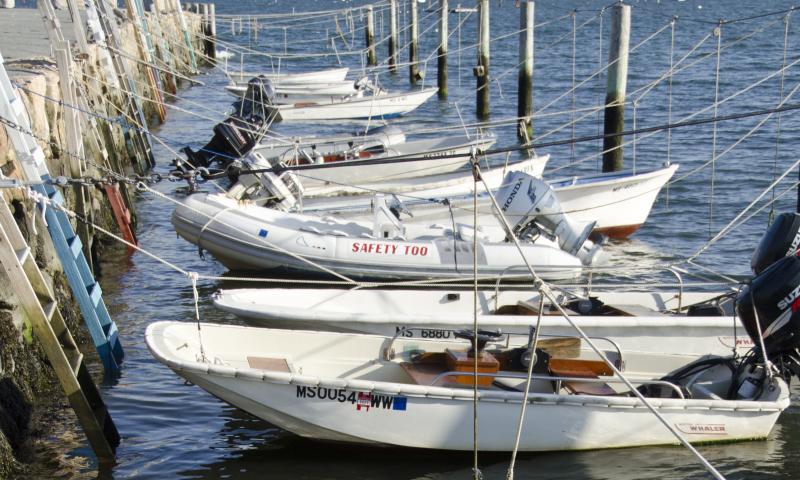Mattapoisett to revamp grandfathered mooring rules
There doesn’t seem to be much consensus about what a “grandfathered” mooring is, but the Marine Advisory Board and new Harbormaster Jill Simmons are planning to clear up any muddy water around the subject.
Of the approximately 1,000 moorings in Mattapoisett, 230 are grandfathered. Contrary to what the title suggests, a grandfathered mooring has nothing to do with family ties.
A grandfathered mooring is one that has been in the hands of the same person since before 1989. What regulations those moorings adhere to is a big question.
“If you ask a dozen different people, a dozen different people are going to tell you a dozen different things about what a grandfathered mooring is,” said Marine Advisory Board Chair Alan Gillis.
While those with grandfathered moorings get some special privileges, they do not include the right to “pass it down” to a neighbor or distant relative or to rent the mooring out to others, which goes against state law.
In a small town where tradition sometimes takes precedence over written regulations, Simmons and the Marine Advisory Board see both happening – while newer residents pay $20 per year to wait patiently in line for just one non-grandfathered mooring.
The town’s “Wharf, Mooring and Anchorage Rules and Regulations” outlines grandfathered moorings as follows: “ownership of private moorings prior to April 24, 1989 shall be limited to one mooring more than the number of boats owned by the mooring permit holder of record.”
“If you have five grandfathered moorings, you better have four boats,” explained Simmons.
All in the family
The rules for handing down a mooring to a relative are the same for grandfathered and regular private moorings. The mooring can be transferred to an immediate relative listed as “children, mother, father, sister, brother, spouse or lineal descendants” in the rules and regulations.
“In our rules, you can transfer our moorings. Our rules mimic the state law,” Simmons said.
The term “lineal descendants” is where some of the confusion comes in that the Marine Advisory Board and harbormaster want to clarify in upcoming discussions.
All individual moorings, as opposed to those ommercial ones, can be passed down to immediate relatives. And Simmons said once a grandfathered mooring is passed down, it becomes a regular mooring.
That could raise some eyebrows. But there are folks in town who are opposed to hand-me-down moorings anyway, said Gillis.
“There are those that say once you up and leave this happy world, if you have a mooring it’s gone. I don’t believe in that,” said Gillis. “I think many families have been here forever. They get passed down from generation to generation. Why shouldn’t they be? It’s a small town. Families come first.”
There is a long line of people waiting for a mooring who pay $20 a year to keep their name in the running. Some of those have been on the list for upwards of a decade.
More than 20 people hold two grandfathered moorings, including four people who have three grandfathered moorings. Those with grandfathered moorings can also hold regular moorings.
Town Clerk Barbara Sullivan says there is no limit to the number of moorings a person can rent, but a household can only acquire one new mooring a year.
Boaters beware
As officials review the rules, another concern will be the mooring holders who rent out their spaces. That’s a big no-no and violates state law, said Simmons.
“We’re going to put a stop to that,” she said.
As the water is officially state owned, Simmons said it cannot be used as income by private mooring holders. The mooring holder owns the tackle, but not the space.
“It does not seem fair to me that people would be out there renting moorings out, making money off them, at the expense of people who have been waiting on the list 15 to 18 years,” she said. “It’s not right and it’s not legal.”
Private and grandfathered mooring holders may give someone permission, at no cost, to use their moorings, but a permit must be filed with the harbormaster.
The private mooring holder can only do so for one year while one grandfathered mooring can be lent to someone else year after year, provided the proper paperwork is filed annually.
Some grandfathered mooring holders may take issue with that restriction, and Simmons admits the current rules are fuzzy.
What is clear, she said, is that mooring holders must still own a boat. Private moorings holders must have an equal number of boats to moorings while grandfathered can have one less boat than moorings.
Additionally, private mooring holders must submit documentation to the harbormaster if they are not going to have a boat on their moorings for a year. Otherwise, it will be revoked. Only someone with a grandfathered mooring can leave one empty indefinitely without losing the mooring.
As the board moves forward, its goal is to write rules for grandfathered moorings that eliminate confusion.
“It’ll take a while, but we’ll get to the bottom of it,” said Simmons. “It’s nice to take care of the people who have been here.”
Simmons will also be on the lookout for people subletting their moorings.
She said, “The town of Mattapoisett is not in the business of augmenting people’s income and neither is the Commonwealth.”
















